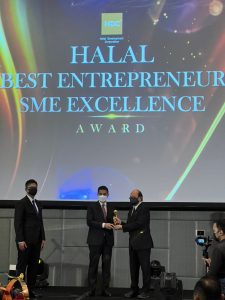
halalmagazin.com talked with Nedžad Biberovi?, marketing manager of the meat industry OVAKO, the company that was among the first in Bosnia and Hercegovina to adopt all the necessary standards for halal quality, about the halal food market in BiH and the region, awareness of consumers, BiH halal brands, but also the problems faced by producers in the domestic market when it comes to Halal standards and public procurement.
How would you describe the halal market in BiH and the region? How does it work, and if you could give us an estimate of its potential financial value?
I have to emphasize that the halal market in this area, unfortunately, is still not viewed in the right way but through a nationalist prism in many ways. If we consider the size of the halal market, or people who genuinely seek halal products, we can conclude that this is still a small market. In our country the halal market is divided into three parts, those who insist on halal products, those who do not pay attention to whether a product is halal or not, and those who avoid halal products. I really have no information about the financial assessment of the market, due to the lack of studies of this kind, so I cannot speak about the value of this market.
What are your experiences with regard to the halal market?
When we talk about our experience, I must say that a lot has been included in the previous answer. I must say that from the economic point of view Halal certification is still something that makes a substantial profit, because it is the brake to entering the markets that are nationally colored. But, I would like to point out that the commitment to halal is honest, and that it is realized with the desire of the owners of companies Akova Impex d.o.o. and Brovis d.d. To provide citizens and employees with halal products. When we talk about the market, it is also necessary to note that halal products buyers are also loyal customers who know that halal product are not only products that comply with religious regulations, but those are products that do not contain anything harmful to the human body.
When your company certified its production, how did it go, how did the market react to this move?
I would like to point out that our company was among the first companies in BiH that has obtained halal certification. If we look at things realistically, no matter what it is we always have two sides, advocates and those who are against it. It was no different with our halal certification.
How much are consumers, particularly in Bosnia, conscious when it comes to eating halal food?
Consumers who are interested in halal products are conscious and knowledgeable about halal procedures. But many people do not know the whole story of halal, and that is that, specifically when growing animals, animals must be treated in a halal way, then they have to be fed halal food (this excludes antibiotics, hormones, bone meal, lard, etc..), and eventually they need to be slaughtered in a halal manner, and science has proved it to be the safest and healthiest way to end an animal’s life.
Could you single out for the portal halalmagazin.com the Bosnian Halal brands that have already gained the trust of consumers both in BiH and the region, and possibly in the world?
Brands that I would single out, additionally to the meat industry Ovako, are definitely all brands of the AS group. I can say that these two companies have done very much in recent years to improve their product quality, branding, design, marketing and all that accompanies a successful company. Although we have a large number of companies that have halal certification, many of them do not communicate it in a proper manner and make it clear to consumers that they are halal certified. A large number of companies make short-term marketing investments thinking that this is enough, but the truth is that without continuous marketing communications, there is no continuous communication with consumers. We also have companies that simply do not have the opportunity to develop, for one simple reason, which is that the entrance to the market is extremely expensive and collection of funds is waited for a long time. In such a situation the government should recognize a quality manufacturer and support them in development, but we all know what the situation is like in the country. Since I am diverting from the subject with this, these issues can be left for another time.
In your opinion, how much do institutions in BiH acknowledge the needs and interests of consumers of halal products and services, and do they take measures in that regard, such as access to and the right to choice in state institutions such as hospitals, institutions of public importance, schools, etc..?
I will emphasize that this is only my opinion created from the experience of working on tenders and incidents that occurred in the past. It is known that during the procurement, the institution that purchases a specific product or service, must clearly specify all items related to the product or service they want to purchase, what it specifically means in this case is that if the institution does not define that it seeks a halal product, then it is unlikely that it will get a halal product. We recently had a case when our children in public kindergartens ate pork pate. Simply, the public procurement process works on the principle of specifications and the lowest price offered. The incident with the pate containing pork is evidence that the procedure should include quality control which will assess whether the product offered meets all the requirements for the tender documents. Generally I am of the opinion that in BiH institutions there is still no awareness of the needs of users of public institutions.
What are your predictions when it comes to the BiH market of halal products and services, as well as the halal market in the Balkan region, what might happen in the future?
The market is defined solely by consumers. Media can, and must have, great support and role in creating markets. I would stress that it is necessary to familiarize people with halal as a whole, because the biggest obstacle is exactly that many people are not familiar with the procedure and they think that halal is only what has been slaughtered in the name of God, not knowing that the product is not halal if it does fulfill the preconditions that I previously mentioned. People need to know that halal is the upgrade to HACCP (sanitary-hygienic control products), and as such, halal guarantees that the product contains absolutely nothing that is harmful to the human body, or that exclusively emulsifiers and additives are used which can be found on the web site of the Agency for Halal Quality Certification www.halal.ba.



